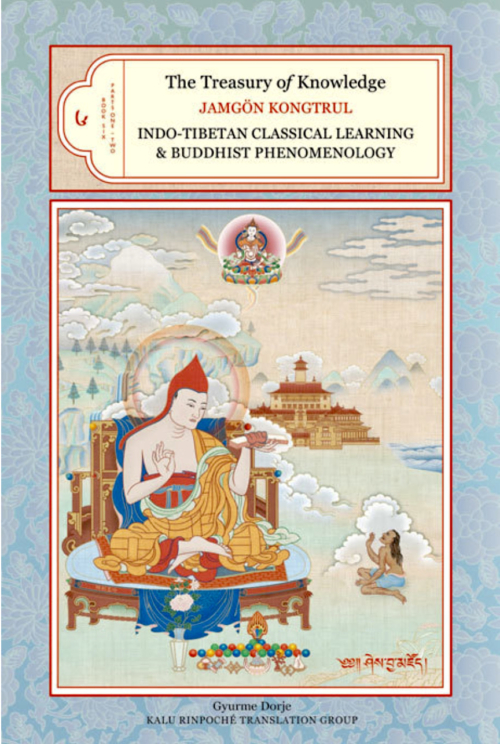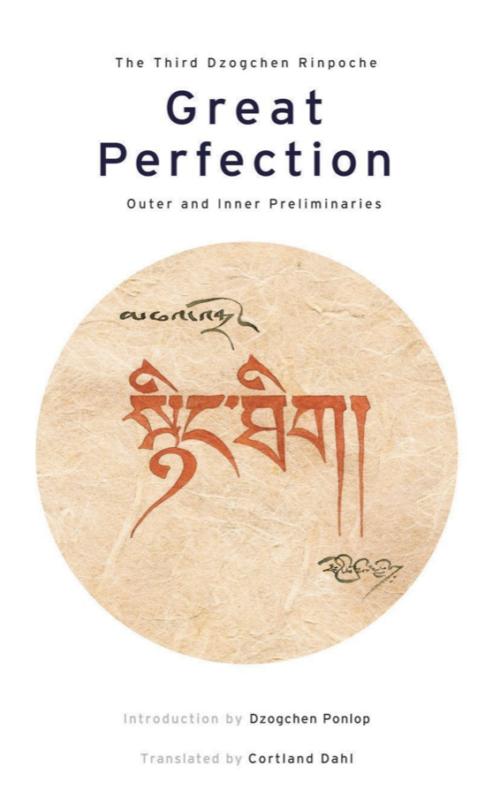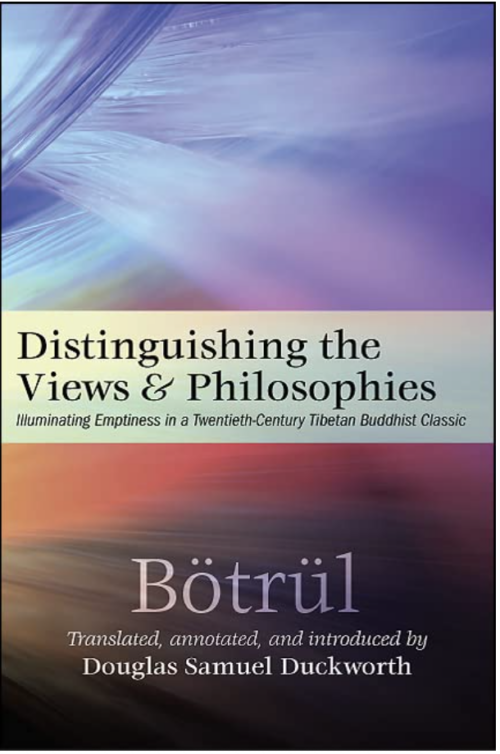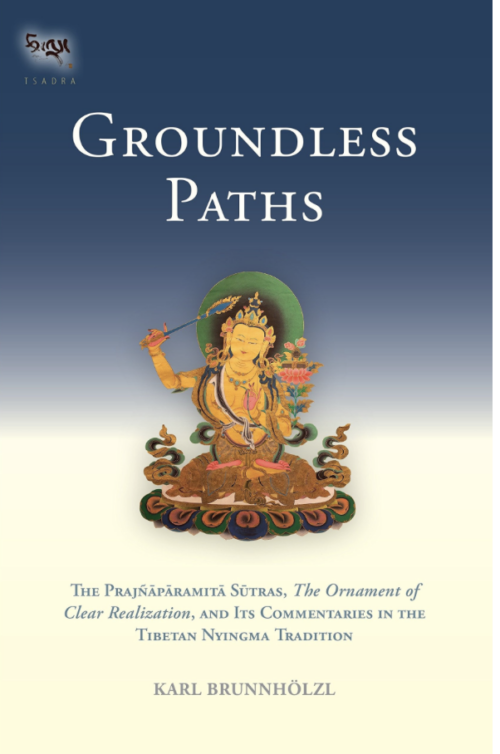- Also available as an eBook for Apple and Android devices.
- The hardcopy book is shipped from the US. International customers may wish to explore local booksellers, Shambala Publications, or Amazon to save on shipping cost.
-
Out of stock
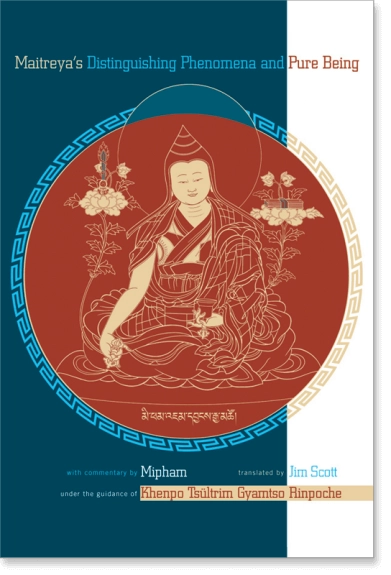 Translated by Jim Scott By Jamgon Mipham Contributions by Jamgon Mipham Distinguishing Phenomena and Pure Being was composed by Maitreya during the golden age of Indian Buddhism. Mipham's commentary supports Maitreya's text in a detailed analysis of how ordinary, confused consciousness can be transformed into wisdom. Easy-to-follow instructions guide the reader through the profound meditation that gradually brings about this transformation. This important and comprehensive work belongs on the bookshelf of any serious Buddhist practitioner—and indeed of anyone interested in realizing their full potential as a human being. Ju Mipham Rinpoche (1846–1912) was a great master of the Nyingma lineage of Tibetan Buddhism and one of the leading figures in the Rime nonsectarian movement in Tibet. This text, along with Ju Mipham Rinpoche's commentary, is taught extensively throughout the world by Khenpo Tsultrim Gyamtso Rinpoche, who considers this text to be of pivotal importance. Jim Scott, a longtime student of Khenpo Tsöltrim Gyamtso Rinpoche, translated this work at his request and under his guidance.
Translated by Jim Scott By Jamgon Mipham Contributions by Jamgon Mipham Distinguishing Phenomena and Pure Being was composed by Maitreya during the golden age of Indian Buddhism. Mipham's commentary supports Maitreya's text in a detailed analysis of how ordinary, confused consciousness can be transformed into wisdom. Easy-to-follow instructions guide the reader through the profound meditation that gradually brings about this transformation. This important and comprehensive work belongs on the bookshelf of any serious Buddhist practitioner—and indeed of anyone interested in realizing their full potential as a human being. Ju Mipham Rinpoche (1846–1912) was a great master of the Nyingma lineage of Tibetan Buddhism and one of the leading figures in the Rime nonsectarian movement in Tibet. This text, along with Ju Mipham Rinpoche's commentary, is taught extensively throughout the world by Khenpo Tsultrim Gyamtso Rinpoche, who considers this text to be of pivotal importance. Jim Scott, a longtime student of Khenpo Tsöltrim Gyamtso Rinpoche, translated this work at his request and under his guidance. -
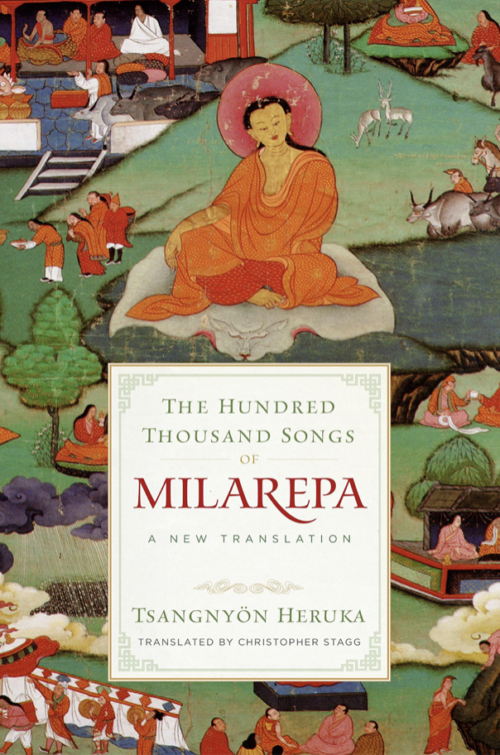
- The hardcopy book is shipped from the US. International customers may wish to explore local booksellers, Shambala Publications, or Amazon to save on shipping cost.
Authors: Tsangnyön Heruka and Milarepa Translator: Christopher Stagg
Christopher Stagg served as a translator and interpreter for the Nitartha Institute and Nalandabodhi, both under the direction of Dzogchen Ponlop Rinpoche. Also trained as a public school music teacher. -
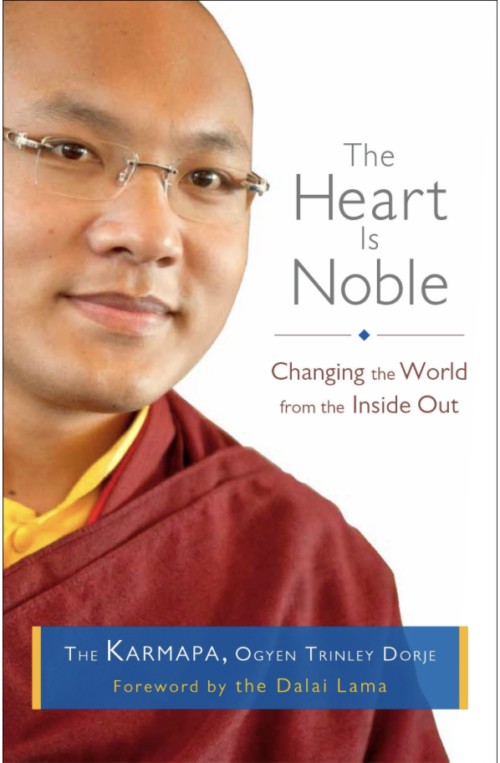
- The hardcopy book is shipped from the US. International customers may wish to explore local booksellers, Shambala Publications, or Amazon to save on shipping cost.
Author: Karmapa Ogyen Trinley Dorje
If you are inspired to take up his challenge, the Karmapa offers a path for participating in a global community that is based on compassion. In these chapters, he shares his vision for bringing social action into daily life, on a scale we can realistically manage through the choices we make every day—what to buy, what to eat, and how to relate honestly and bravely with our friends and family and coworkers. His fresh and encouraging perspective shows us that we have the strength to live with kindness in the midst of the many challenges we face as socially and environmentally conscious beings. Because he sees the world through the lens of the interdependence of all beings, he sees that humans can change social and environmental problems by changing their attitudes and actions. And so, he shows ways that we can change our world by changing ourselves—by examining our own habits of consumption and by being willing to look into how our food reaches our table and how the products we buy are made. In his chapter on gender, he points out that we don’t have to label others according to a social construct.
If his viewpoint seems optimistic, it is—and it’s also demanding. The Karmapa calls on us to open our mind and heart to the innumerable connections we share with others—in our families, communities, social systems, and on our planet. Thanks to the depth of his spiritual training, and the breadth of his curiosity about the world and his love for it, he presents a relevant framework for understanding what it means to be human now—and why it’s imperative that we concern ourselves with the well-being of all others. He points to a world we can create through our own effort, using a resource we already have in abundance—the basic nobility of our human heart. The 17th Gyalwang Karmapa, Ogyen Trinley Dorje, is the spiritual head of one of the major schools of Tibetan Buddhism. The 900-year-old lineage of Karmapas has included some of Tibet’s greatest spiritual masters. Born to nomadic parents in rural Tibet, he was identified while still a young child as the heir to this leadership position. In 2000, the Karmapa’s dramatic escape to India from Chinese-ruled Tibet at the age of fourteen propelled him onto the world stage. Since then, he has emerged as an international Buddhist leader and environmental activist, founding Khoryug, a region-wide environmental protection program. The Karmapa has been dubbed the "new face of Tibetan Buddhism," and many Tibetans look to the Karmapa for inspiration in their struggle to preserve their embattled culture. In 2008, he made his historic first visit to America. -
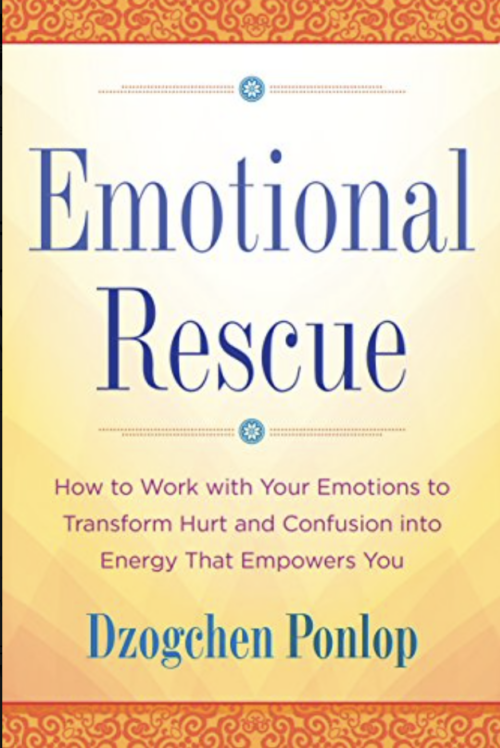
- The hardcopy book is shipped from the US. International customers may wish to explore local booksellers, Shambala Publications, or Amazon to save on shipping cost.
Author: Dzogchen Ponlop Rinpoche
In this life-changing book, acclaimed Buddhist teacher Dzogchen Ponlop Rinpoche shows how to free yourself from being a victim of your emotions by gaining the awareness and understanding that will help you harness their power. Emotions bring color and meaning to our lives, but they can also put us on an exhausting rollercoaster ride that takes us to blissful peak states, the depths of delusion and despair, and everything in between. It is only by learning to relate to our emotions skillfully that we benefit from their richness and glean wisdom, rather than letting them control us. Emotions get their power from a simple but deep-seated source: our lack of self-knowledge. When we bring awareness to our experience of emotions, something truly amazing happens—they lose their power to make us miserable. In this book, Rinpoche leads us through the three steps of his Emotional Rescue Plan. Mindful Gap is the practice of creating a safe distance between you and your emotions, which gives you the psychological space to work with their energy. Clear Seeing involves recognizing the bigger picture. Last, Letting Go is the practice of releasing stressful physical and emotional energy through exercise, relaxation, and awareness. With each step, we become increasingly familiar with the inner workings of our emotions, seeing straight to the heart of anger, fear, passion, jealousy, and pride. With time and practice, instead of leading us astray, our emotions become our guide towards living a more compassionate, creative, and fulfilling life. Dzogchen Ponlop Rinpoche is a widely celebrated Buddhist teacher and the author of Rebel Buddha: A Guide to a Revolution of Mind. ("Rinpoche" is an honorific reserved for highly respected Buddhist teachers.) He is the founder and president of Nalandabodhi, an international network of Buddhist centers. -
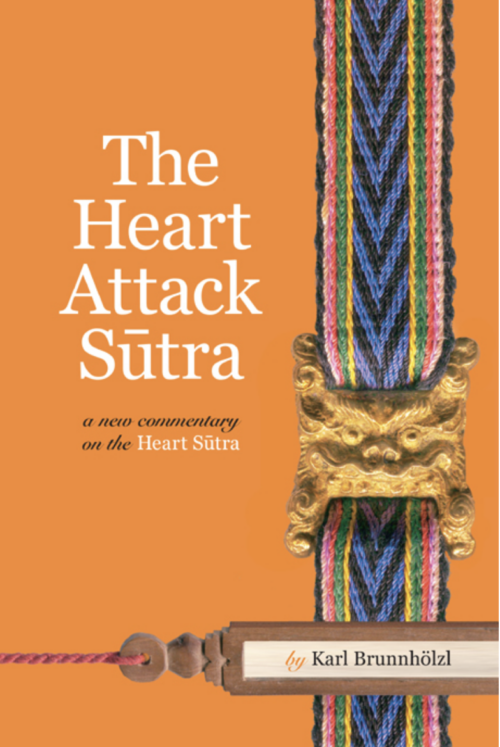
- The hardcopy book is shipped from the US. International customers may wish to explore local booksellers, Shambala Publications, or Amazon to save on shipping cost.
Author: Mitra Dr. Karl Brunnhölzl
A guide to the famous Heart Sūtra that reveals the tenderness and compassion underlying the striking rhetoric of this popular Buddhist text The radical message of the Heart Sūtra, one of Buddhism’s most famous texts, is a sweeping attack on everything we hold most dear: our troubles, the world as we know it, even the teachings of the Buddha himself. Several of the Buddha’s followers are said to have suffered heart attacks and died when they first heard its assertion of the basic groundlessness of our existence—hence the title of this book. Overcoming fear, the Buddha teaches, is not to be accomplished by shutting down or building walls around oneself, but instead by opening up to understand the illusory nature of everything we fear—including ourselves. In this book of teachings, Karl Brunnhölzl guides practitioners through this ‘crazy’ sutra to the wisdom and compassion that lie at its core. Karl Brunnhölzl, MD, was trained as a physician and also studied Tibetology. He received his systematic training in Tibetan language and Buddhist philosophy and practice at the Marpa Institute for Translators, founded by Khenpo Tsultrim Gyamtso Rinpoche. Since 1989 he has been a translator and interpreter from Tibetan and English. He is presently involved with the Nitartha Institute as a teacher and translator. -
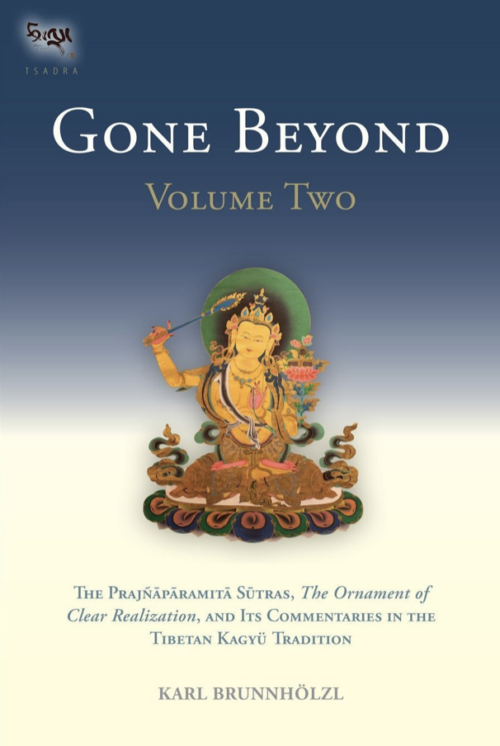
- The hardcopy book is shipped from the US. International customers may wish to explore local booksellers, Shambala Publications, or Amazon to save on shipping cost.
Translator: Mitra Dr. Karl Brunnhölzl
The Abhisamayalamkara summarizes all the topics in the vast body of the Prajnaparamita Sutras. Resembling a zip-file, it comes to life only through its Indian and Tibetan commentaries. Together, these texts not only discuss the "hidden meaning" of the Prajnaparamita Sutras—the paths and bhumis of sravakas, pratyekabuddhas, and bodhisattvas—but also serve as contemplative manuals for the explicit topic of these sutras—emptiness—and how it is to be understood on the progressive levels of realization of bodhisattvas. Thus these texts describe what happens in the mind of a bodhisattva who meditates on emptiness, making it a living experience from the beginner's stage up through buddhahood. Gone Beyond contains the first in-depth study of the Abhisamayalamkara (the text studied most extensively in higher Tibetan Buddhist education) and its commentaries in the Kagyu School. This study (in two volumes) includes translations of Maitreya's famous text and its commentary by the Fifth Shamarpa Goncho Yenla (the first translation ever of a complete commentary on the Abhisamayalamkara into English), which are supplemented by extensive excerpts from the commentaries by the Third, Seventh, and Eighth Karmapas and others. Thus it closes a long-standing gap in the modern scholarship on the Prajnaparamita Sutras and the literature on paths and bhumis in mahayana Buddhism. The first volume presents an English translation of the first three chapters of the Abhisamayalamkara and its commentary by the Fifth Shamarpa. The second volume presents an English translation of the final five chapters and its commentary by the Fifth Shamarpa. Karl Brunnhölzl, MD, was trained as a physician and also studied Tibetology. He received his systematic training in Tibetan language and Buddhist philosophy and practice at the Marpa Institute for Translators, founded by Khenpo Tsultrim Gyamtso Rinpoche. Since 1989 he has been a translator and interpreter from Tibetan and English. He is presently involved with the Nitartha Institute as a teacher and translator. -
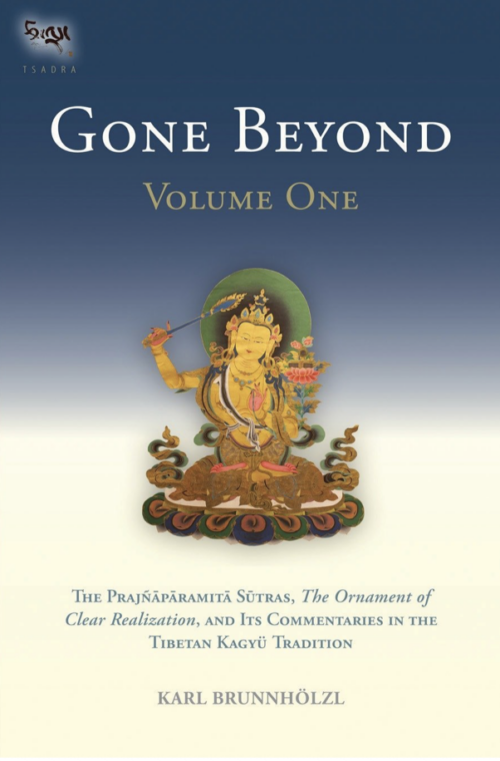
- The hardcopy book is shipped from the US. International customers may wish to explore local booksellers, Shambala Publications, or Amazon to save on shipping cost.
Translator: Mitra Dr. Karl Brunnhölzl
The Abhisamayalamkara summarizes all the topics in the vast body of the Prajnaparamita Sutras. Resembling a zip-file, it comes to life only through its Indian and Tibetan commentaries. Together, these texts not only discuss the "hidden meaning" of the Prajnaparamita Sutras—the paths and bhumis of sravakas, pratyekabuddhas, and bodhisattvas—but also serve as contemplative manuals for the explicit topic of these sutras—emptiness—and how it is to be understood on the progressive levels of realization of bodhisattvas. Thus these texts describe what happens in the mind of a bodhisattva who meditates on emptiness, making it a living experience from the beginner's stage up through buddhahood. Gone Beyond contains the first in-depth study of the Abhisamayalamkara (the text studied most extensively in higher Tibetan Buddhist education) and its commentaries in the Kagyu School. This study (in two volumes) includes translations of Maitreya's famous text and its commentary by the Fifth Shamarpa Goncho Yenla (the first translation ever of a complete commentary on the Abhisamayalamkara into English), which are supplemented by extensive excerpts from the commentaries by the Third, Seventh, and Eighth Karmapas and others. Thus it closes a long-standing gap in the modern scholarship on the Prajnaparamita Sutras and the literature on paths and bhumis in mahayana Buddhism. The first volume presents an English translation of the first three chapters of the Abhisamayalamkara and its commentary by the Fifth Shamarpa. The second volume presents an English translation of the final five chapters and its commentary by the Fifth Shamarpa. Karl Brunnhölzl, MD, was trained as a physician and also studied Tibetology. He received his systematic training in Tibetan language and Buddhist philosophy and practice at the Marpa Institute for Translators, founded by Khenpo Tsultrim Gyamtso Rinpoche. Since 1989 he has been a translator and interpreter from Tibetan and English. He is presently involved with the Nitartha Institute as a teacher and translator.
